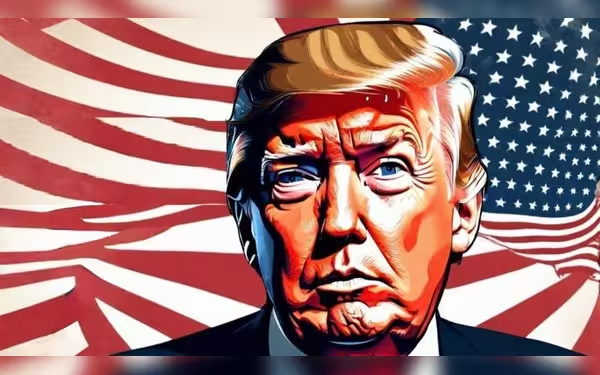Thursday, November 7, 2024 03:38 AM
Trump's Potential Return: Implications for Global Stability
- Trump's return raises concerns for global democracy.
- China's ambitions towards Taiwan could escalate.
- NATO's credibility may be undermined under Trump.
 Image Credits: thefridaytimes
Image Credits: thefridaytimesTrump's potential return to presidency poses risks for democracy, international relations, and global stability.
The world is currently at a crossroads, grappling with the implications of Donald Trump’s potential return to the presidency. The political landscape has shifted dramatically since his first term, and many are concerned about what a second Trump administration could mean for global stability and democracy. The rise of populism has already challenged the foundations of liberal democracy, and Trump's election could further exacerbate these issues.
Since the early 2000s, we have witnessed a decline in democratic values, often referred to as the era of democratic recession. The 2016 election marked a significant turning point, as Trump emerged as a populist leader in the heartland of liberal democracy. His promises to make 'America Great Again' resonated with many, but his inability to deliver on these promises has left a void that could lead to further disillusionment among the American populace.
As Trump potentially prepares to take office again, there are growing concerns about the implications for international relations, particularly regarding China and Taiwan. The Chinese government, under Xi Jinping, is increasingly anxious about its ambitions to reunify Taiwan with the mainland. Xi has emphasized that this 'historic mission cannot be passed down from generation to generation,' indicating a sense of urgency. With the timeline of 2027 approaching, Taiwan's vulnerability is heightened, especially if the United States reduces its military presence in the region.
Trump's 'America First' policy suggests a shift towards an isolationist approach, which could embolden China to take aggressive actions against Taiwan. The delicate balance of power in the region is at stake, and any miscalculation could lead to significant consequences not only for Taiwan but also for neighboring countries like Japan and South Korea.
Moreover, Trump's stance on Ukraine raises alarms about the future of NATO and U.S. alliances. His previous comments about cutting aid to Ukraine and questioning the necessity of NATO could undermine the credibility of the United States as a protector of its allies. If Trump follows through on these threats, it could lead to a domino effect, prompting NATO and non-NATO states to reconsider their security arrangements.
In the Middle East, Trump's return could reignite tensions, particularly regarding Israel and Palestine. His previous actions, such as recognizing Jerusalem as Israel's capital and withdrawing from the Iran nuclear deal, have already strained relations in the region. With Trump back in power, the potential for conflict could escalate, especially if Iran pursues nuclear capabilities in response to perceived threats.
The ramifications of Trump's policies could extend beyond international relations. The loss of human lives in conflicts, particularly in Gaza, may fuel anti-American sentiments in the Muslim world, leading to a resurgence of terrorism and extremism. The cycle of violence could spiral out of control, affecting not only the Middle East but also the United States itself.
The prospect of Trump’s election as the 47th president of the United States poses significant challenges for democracy and global stability. The potential for increased tensions with China, the undermining of NATO, and the escalation of conflicts in the Middle East are all pressing concerns. As the world watches closely, it is crucial for leaders to prioritize diplomacy and cooperation to navigate these turbulent waters. The future of democracy and international relations hangs in the balance, and the choices made in the coming years will shape the world for generations to come.













